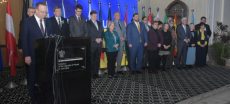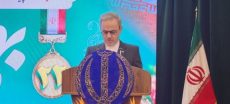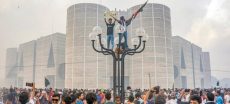US President Donald Trump is set to host Saudi Arabia’s de facto ruler, Crown Prince Mohammed bin Salman, on Tuesday in a visit expected to push forward the sale of F-35 fighter jets and a range of major business agreements.
This marks MBS’s first trip to the US since the 2018 killing of journalist Jamal Khashoggi, a murder that sparked worldwide condemnation. US intelligence later concluded that the crown prince approved the operation, though he denied ordering it while accepting overall responsibility as the country’s leader. His warm reception in Washington signals that ties have largely recovered.
During a full day of engagements at the White House, MBS will meet Trump in the Oval Office, join him for lunch in the Cabinet Room, and attend an evening black-tie dinner.
Trump aims to capitalize on a $600 billion Saudi investment pledge made during his earlier visit to the kingdom. A senior official told Reuters that agreements spanning defense, technology, manufacturing, and other sectors are expected. Trump also stated Monday, “We’ll be selling” F-35s to Saudi Arabia, which has requested 48 jets—a move that would mark the first-ever US sale of the aircraft to Riyadh and a significant shift in regional defense policy. The sale could reshape the Middle East’s military landscape and raise questions about maintaining Israel’s “qualitative military edge,” as Israel is currently the region’s only F-35 operator.
Beyond defense, MBS is seeking security guarantees, access to AI technologies, and progress on a civilian nuclear deal. “The Saudis will be spending a lot of money tomorrow on the U.S.,” a senior White House official said.
Analysts say Trump wants to deepen ties to prevent Riyadh from drifting toward China. Former US Middle East negotiator Dennis Ross noted that Trump is building a comprehensive partnership across security, technology, energy, and finance to anchor Saudi firmly within the US orbit.
Trump is also expected to press the crown prince to join the Abraham Accords and normalize relations with Israel. Riyadh has been hesitant without a clear path toward Palestinian statehood, a goal overshadowed by the Gaza conflict. While several regional states joined the accords during Trump’s first term—Bahrain, the UAE, Morocco, and Sudan—he has long viewed Saudi participation as crucial for broader Middle East peace.
A senior US official said Trump is determined to secure Saudi Arabia’s inclusion during his current term and has intensified pressure on that front.
Jonathan Panikoff, a former US intelligence official, said Trump will push for progress on normalization with Israel, but any delays are unlikely to derail a wider US–Saudi security agreement. Saudi investment in the US, he added, could pave the way for deeper defense cooperation even as Trump prioritizes Israeli-Saudi rapprochement.
Also Read Trump Finalizes Multi-Billion Dollar Agreements with Saudi Arabia











